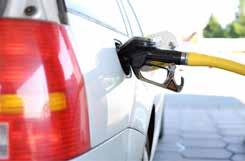
3 minute read
Life Hacks
THE SIMPLE TRICK THAT WILL SAVE YOU MONEY ON PETROL
Did you know that the simple trick of keeping your windows clean can help you save money on petrol? Motorists will either crank up the heating or put on the air-con to help clear the frost or condensation from their windows, but this increases fuel and energy consumption. In fact, blasting the air-conditioning can add up to 10% to fuel consumption according to Uswitch, and is especially apparent at lower speeds. Here are some other ideas from Uswitch on how to save money on fuel:
Advertisement
Keep your tyres inflated
If your tyres are under-inflated your car’s engine will have to work harder to get them turning properly, which means you’ll use more fuel. Check your tyre pressure once a month; being under-inflated by 6psi can increase your fuel consumption by 1%. On the flip side, correctly inflated tyres can improve your mileage per tank by up to 3%.
Clear out your boot
The heavier the vehicle, the more energy it needs to get moving. Extra weight also increases a vehicle's rolling resistance, which is a force that resists forward motion as the wheels roll over the road. This means all that extra weight is actually dragging you back!
Don’t wait to warm up
If you let your car engine warm up before hitting the road, you could be damaging your car, not to mention the environment. If it takes you 10 minutes to warm up your car, you're losing petrol at a rate of 2p-3p every minute. Alongside this, leaving your car to warm up whilst stationary actually reduces the life of the car’s engine as it strips away oil from the cylinders and pistons.
Stick to the speed limit
Breaking speed limits adds to your carbon footprint. Over 15 million people in the UK are guilty of busting the 70mph limit, adding 890,000 tons of carbon emissions each year. Not only will driving slower help you become a greener driver, it will also save you money on fuel. Drive at 70mph and you’ll use up to 9% more than at 60mph, and up to 15% more than at 50mph. Pushing it up to 80mph can use up to 25% more fuel than at 70mph.
Avoid sharp braking
Harsh braking is said to use up to 30% more fuel and damage your brakes over time, which means you could also save yourself a small fortune by taking more caution when out on the road. As braking sharply often results in traffic slowing to a near stop due to the delayed reaction of drivers behind, by observing the three or four cars ahead, it becomes easier to anticipate and judge the necessary speed.
HOW TO…COPE WITH A DENTAL EMERGENCY
Firstly, it’s important to understand whether or not the situation is an emergency or not. Issues such as a lost filling, dull toothache, mild sensitivity or a small chip in a tooth can all be treated at a later date.

Examples of more serious issues which would constitute an emergency include gums that won’t stop bleeding, extreme tooth sensitivity or toothache causing constant pain, a tooth that has been knocked out or swollen cheeks/ gums and general extreme pain from swelling or possible infection. Should you experience any of the above, try calling your dentist in the first instance as they may have set up a helpline to offer advice and if symptoms continue, call the NHS help service on 111. Here are a few things you can do at home to try and ease the situation: • If a tooth is knocked out, place it in a glass of milk until it can be treated (the milk helps keep an acid-alkali ratio meaning the tooth won’t swell) • If safe to do so, take paracetamol or ibuprofen to help reduce the immediate pain • Hold an ice pack (or a pack of frozen veg) on areas of swelling • Dissolve salt in warm water and swish around the mouth for 60 seconds to help remove bacteria and clear infection • Rinsing for 30 seconds with a hydrogen peroxide solution will also act as an antibacterial mouthwash for pain and inflammation • Dab a small amount of clove oil on the affected area to help reduce pain









